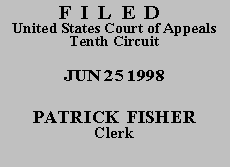

| STEVE WILLIAMS,
Petitioner-Appellant, v. ROBERT FURLONG, Warden; ATTORNEY GENERAL OF THE STATE OF COLORADO, Respondents-Appellees. |
|
Petitioner appeals the district court's order denying his petition for a writ of habeas corpus filed pursuant to 28 U.S.C. § 2254. Petitioner pled guilty to two counts of first degree sexual assault in state court, for which he received two consecutive thirty-year sentences. After exhausting his state remedies, petitioner filed the present habeas petition seeking to set aside his guilty plea on the ground that it was a product of the constitutionally ineffective assistance of his trial counsel. The district court appointed counsel to represent petitioner in the habeas proceedings and the magistrate judge held an evidentiary hearing on petitioner's claims. Thereafter, the magistrate judge issued a lengthy report recommending that habeas relief be denied. Four weeks later, the district court adopted the magistrate judge's report and recommendation and dismissed the habeas petition. This appeal followed.
As an initial matter, we must consider whether petitioner has properly preserved his arguments for appellate review. The magistrate judge's report and recommendation explicitly directed the parties to serve and file written objections to the proposed findings and recommendation within ten days, and warned them that the "[f]ailure to make timely objections to the magistrate judge's recommendation may result in a waiver of the right to appeal from a judgment of the district court based on the findings and recommendations of the magistrate judge." R., Vol. I, Doc. 59 at 30. Petitioner, however, failed to file any objections to the magistrate judge's report and recommendation.
"It is settled Tenth Circuit law that when a party fails to object to the magistrate's findings and recommendations within the appropriate time, he or she waives the right to appellate review." Trierweiler v. Croxton & Trench Holding Corp., 90 F.3d 1523, 1533 (10th Cir. 1996). We may make an exception to this firm waiver rule when the interests of justice so require. See, e.g., Moore v. United States, 950 F.2d 656, 659 (10th Cir. 1991). No exception to the waiver rule is warranted in this case, however.
Therefore, the judgment of the United States District Court for the District of Colorado is AFFIRMED.
Entered for the Court
Circuit Judge
*. This order and judgment is not binding precedent, except under the doctrines of law of the case, res judicata, and collateral estoppel. The court generally disfavors the citation of orders and judgments; nevertheless, an order and judgment may be cited under the terms and conditions of 10th Cir. R. 36.3.